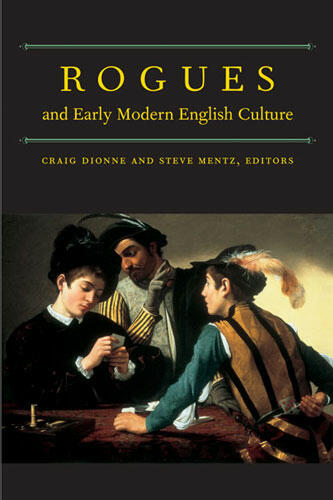Rogues and Early Modern English Culture
A definitive collection of critical essays on the literary and cultural impact of the early modern rogue
Description
"Those at the periphery of society often figure obsessively for those at its center, and never more so than with the rogues of early modern England. Whether as social fact or literary fiction-or both, simultaneously-the marginal rogue became ideologically central and has remained so for historians, cultural critics, and literary critics alike. In this collection, early modern rogues represent the range, diversity, and tensions within early modern scholarship, making this quite simply the best overview of their significance then and now."
-Jonathan Dollimore, York University
"Rogues and Early Modern English Culture is an up-to-date and suggestive collection on a subject that all scholars of the early modern period have encountered but few have studied in the range and depth represented here."
-Lawrence Manley, Yale University
"A model of cross-disciplinary exchange, Rogues and Early Modern English Culture foregrounds the figure of the rogue in a nexus of early modern cultural inscriptions that reveals the provocation a seemingly marginal figure offers to authorities and various forms of authoritative understanding, then and now. The new and recent work gathered here is an exciting contribution to early modern studies, for both scholars and students."
-Alexandra W. Halasz, Dartmouth College
Rogues and Early Modern English Culture is a definitive collection of critical essays on the literary and cultural impact of the early modern rogue. Under various names-rogues, vagrants, molls, doxies, vagabonds, cony-catchers, masterless men, caterpillars of the commonwealth-this group of marginal figures, poor men and women with no clear social place or identity, exploded onto the scene in sixteenth-century English history and culture. Early modern representations of the rogue or moll in pamphlets, plays, poems, ballads, historical records, and the infamous Tudor Poor Laws treated these characters as harbingers of emerging social, economic, and cultural changes.
Images of the early modern rogue reflected historical developments but also created cultural icons for mobility, change, and social adaptation. The underclass rogue in many ways inverts the familiar image of the self-fashioned gentleman, traditionally seen as the literary focus and exemplar of the age, but the two characters have more in common than courtiers or humanists would have admitted. Both relied on linguistic prowess and social dexterity to manage their careers, whether exploiting the politics of privilege at court or surviving by their wits on urban streets.
Deftly edited by Craig Dionne and Steve Mentz, this anthology features essays from prominent and emerging critics in the field of Renaissance studies and promises to attract considerable attention from a broad range of readers and scholars in literary studies and social history.
Craig Dionne is Professor of English Literature at Eastern Michigan University.
Steve Mentz is Assistant Professor of English at St. John's University.
Reviews
". . . rogues represent the range, diversity, and tensions within early modern scholarship, making this quite simply the best overview of their significance then and now."
---Jonathan Dollimore, York University
"A model of cross-disciplinary exchange . . . an exciting contribution to early modern studies, for both scholars and students."
---Alexandra W. Halasz, Dartmouth College

